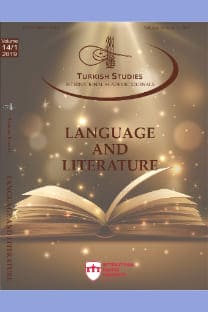MAKSİM GORKİ'NİN ANA ESERİ ÜZERİNDEN SOSYALİST REALİZM VE EDEBİYATTA PROPAGANDA-ANTİPROPAGANDA
Edebiyatın toplumlar üzerindeki etkisi tartışılmaz bir gerçektir. Bu etki, zaman zaman bir yönetim sistemi için propaganda aracı olarak kullanılabilirken, mevcut sistemin muhalifi için ise antipropagandaya dönüşebilmektedir. Edebiyat, oluştuğu sosyolojik yapı içerisindeki etkileşimin niteliği ve kullanılan ölçütler doğrultusunda belirli akımlar içerisine konularak sınıflandırılmıştır. Bu akımlar, metnin türü, ele alındığı dönem, coğrafi, politik, ekonomik ve dini yapıya göre değişebilmektedir. Çalışmada ele alınacak olan sosyalist realizm akımı da kendine özgü niteliklere sahiptir. Rusya’da ortaya çıkmış olan sosyalist realizm, dönemin siyasi yapısının edebiyata yansımasıdır denilebilir. Makalede söz konusu akımın oluşum süreci, önemli yazarları ve uygulama alanındaki yansımalarından örnekler verilecektir. Dönemin önemli yazarı ve sosyalist realizmin oluşumunda öncü sayılan Maksim Gorki’nin “Ana” adlı eserinden seçilecek örneklerle akımın toplum üzerindeki etkisi ve genel anlamda edebiyatın bir propagandaantipropaganda aracı olarak yansımaları incelenecektir. Makalede ayrıca, ele alınan eserdeki kahramanlar üzerinden sosyalist realist akımda oldukça önemli bir kavram olan ruhsal diyalektiğin önemine de değinilecektir. Bireyin içsel gelişiminin ve dönüşümünün ruhsal diyalektik şeklinde kavramsallaştırılarak belirli bir amaç doğrultusunda sözü edilen akım içerisinde bir propaganda aracı olarak kullanılmasının altı çizilecektir. Böylelikle edebiyatın, yönetim sistemlerinin, toplumun ve bireyin negatif ve pozitif etkilerine değinilecektir. Başka bir deyişle edebiyatın, yönetim sistemlerinin ve ideolojilerin etkisi altında toplumu manipüle edebilme potansiyeline değinilirken, aynı zamanda sistemin şekillenmesindeki yeri vurgulanacaktır. Ayrıca incelenen eserin, edebiyat alanında çalışanlar için farklı bir analizi yapılırken, sosyalist realist akıma başka bir açıdan da değinilmiş olacaktır.
SOCIALIST REALISM AND PROPAGANDA-ANTIPROPAGANDA IN LITERATURE: MAXIM GORKY'S MOTHER
The effect of literature on societies is an indisputable fact. This effect can sometimes be used not only as a tool for propaganda by a system of government, but also as a tool for antipropaganda by the opposition to the existing system. Literature has always been classified into certain movements in line with the criteria used and the nature of the interaction within the sociological structure in which it was formed. These trends may vary according to the type of text, the period in which it is handled, the geographical, political, economic and religious structure behind it. The movement of socialist realism discussed in this study has its own characteristics, as well. Having emerged in Russia, socialist realism is a reflection of the political structure of the period on literature. In this article, the formation process of the movement, important authors and reflections in the literary environment will be exemplified. The influence of the movement on society and the use of literature as a means of propaganda and antipropaganda will be examined by means of examples selected from Mother by Maxim Gorky, an important author of the period and considered a pioneer in the formation of socialist realism. In this article, the importance of spiritual dialectic, which is a very important concept in the socialist realist movement, will be discussed through the heroes in the work. It will be emphasized that the use of spiritual dialectic as a propaganda tool in the transformation of society and the individual. Thus, negative and positive effects of literature on systems of government will be discussed. In other words, while discussing the potential of literature to manipulate society under certain systems of government and ideologies, this article will also emphasize literature’s role in shaping the system. In addition, Gorky’s novel will be approached from a different angle while the socialist realist movement will be discussed accordingly.
___
Aleksandroviç, D. P. (2013). “Sotsialistiçeckiy realizm: metod, stil, idelogiya.” İzd. Jurnal Gramata, no.32 (38), s. 162-166
Bulavka, L. A. (2007). Sotsialistiçeckiy realizm prevratnosti metoda filosofskiy diskurs. Moskva: İzd. Revolyutsiya Kultura.
Buşmin, A. S. Kupreyanova, E. N. Livaçyov, D. S. & Makogonenko, G. P. (1983). İstoriya ruskoy literature v çetıryoh tomah tom-4. İzd. Akademiya Nauk SSSR. İnstitut Ruskoy Literature (Puşkinskiy Dom).
Dubrovina, N. V. (2011). “Sotsialistiçeskiy realizm metod i stil.” Tomsk: Vestnik TGU. Vıpusk 7, (99) strnts. 181-185.
Ermolayev, G. (1968). “Mostı, literaturno-hudojestvennıy i obşçestvenno-politiçeskiy almanah.” Münhen: Tovarişçestvo Zarubejnıh Pisateley. S.295-313.
Gorki, M. (2016) Ana, çev. Mazlum Beyhan. İstanbul: Evrensel Basım Yayın.
Lenin, V. İ. (1968). Filosofskiye tetradi polnoye sobraniye soçineniy izdanie 5, tom 29.Moskva: Gosudarstvennoye İzdatelstvo Politiçeskoy Literature Moskva.
Lenin, V. İ. (1969). Partiynaya organizatsiya i partiynaya literatura. Polnoye sobraniye soçineniy izdanie 5, tom 12. Moskva: Gosudarstvennoye İzdatelstvo Politiçeskoy Literature Moskva.
Pern, T. (2010). “Socialist realism as anti-canonical art.” Central and Eastern European Online library Interlitteraria, issue 15 (2), p. 531-544
Popper, K. (1995). Şto takoye dialektika. Voprosı Filosofii, No. 1. s. 118-138.
Rezikova, B. (1932). “N. A. Dobrolyubov “provitsionalnaya holera” Moskva: Jurnalno-Gazetno Abyedinenie. Literaturnoe Nasledstvo tom.3. strnt. 109-142.
Şalaginov, N. V. (2006). Ruskaya literatura sotsialistiçeskogo realizma i ee genesisa. Nijniv Novgorod, Nijegorodskiy Gosudarstvennıy Universitet im. N. İ Lubaçevskogo. Dissertatsiya na soiskanie uçyonoy stepeni kandidata filologiçeskih nauk.
Tağızade, L. (2006). “Sosyalist realizm: kökeni, oluşumu süreci ve kavramı.” Modern Türklük Araştırmaları Dergisi, Cilt-3, Sayı-4. s.7-24.
Taygin, A. (1958). Sotsialistiçeskiy realizm, zametki o sovetskoy literature. Münhen: İzd. Tsentralnogo Obyedineniya Politiçeskih Emigrantov iz SSSR (TSOPE).
Yudin, A. İ. (2013). Teoriya trudyaşçihsya N. G. çernişevskogo. istoriçeskiye, filosofskiye, politiçeskiye i yuridiçeskiye nauki, kulturalıgiya i iskustvovedeniye. Gramota: No-1(27) s.214-219.
